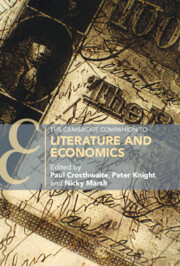Book contents
- The Cambridge Companion to Literature and Economics
- The Cambridge Companion to Literature and Economics
- Copyright page
- Contents
- Contributors
- Introduction
- Part I Histories and Critical Traditions
- Part II Contemporary Critical Perspectives
- Chapter 8 The Economy of Race
- Chapter 9 American Literature and the Fiction of Corporate Personhood
- Chapter 10 Political Economy, the Family, and Sexuality
- Chapter 11 The Literary Marketplace and the Rise of Neoliberalism
- Chapter 12 World-Systems and Literary Studies
- Chapter 13 Crisis, Labor, and the Contemporary
- Chapter 14 Speculative Fiction and Post-Capitalist Speculative Economies: Blueprints and Critiques
- Part III Interdisciplinary Exchanges
- Further Reading
- Index
- Cambridge Companions To …
Chapter 14 - Speculative Fiction and Post-Capitalist Speculative Economies: Blueprints and Critiques
from Part II - Contemporary Critical Perspectives
Published online by Cambridge University Press: 28 July 2022
- The Cambridge Companion to Literature and Economics
- The Cambridge Companion to Literature and Economics
- Copyright page
- Contents
- Contributors
- Introduction
- Part I Histories and Critical Traditions
- Part II Contemporary Critical Perspectives
- Chapter 8 The Economy of Race
- Chapter 9 American Literature and the Fiction of Corporate Personhood
- Chapter 10 Political Economy, the Family, and Sexuality
- Chapter 11 The Literary Marketplace and the Rise of Neoliberalism
- Chapter 12 World-Systems and Literary Studies
- Chapter 13 Crisis, Labor, and the Contemporary
- Chapter 14 Speculative Fiction and Post-Capitalist Speculative Economies: Blueprints and Critiques
- Part III Interdisciplinary Exchanges
- Further Reading
- Index
- Cambridge Companions To …
Summary
This chapter examines how aspects of post-capitalism have been imagined by speculative fiction, with some emphasis on utopian and dystopian fiction. There are some methodological issues around the best way to read speculative fiction in relation to post-capitalism. One influential distinction is between “blueprint” utopias and “critical” utopias. Blueprint utopias, such as Edward Bellamy’s Looking Backward (1888), are held to offer rigidly instrumental plans for reorganizing society. Critical utopias, such as Ursula K. Le Guin’s The Dispossessed (1974), supposedly destabilize deeply-rooted assumptions, freeing readers to explore possible economic forms that appear neither in reality nor fiction. However, this chapter emphasises that the distinction between blueprint and critical utopias is a blurred one. It further suggests that instrumentalizing interpretations of speculative fiction are part of its status as culture, rather than a mere misuse of speculative fiction. Reading speculative fiction critically and creatively, including attention to its instrumentalities, may help to transform what constitutes the field of “the economic” in the first place, and enrich our understanding both of capitalism and its alternatives. However, already existing practices of the more-than-capitalist world often far exceed what speculative fiction has been capable of imagining.
Keywords
- Type
- Chapter
- Information
- The Cambridge Companion to Literature and Economics , pp. 227 - 242Publisher: Cambridge University PressPrint publication year: 2022
- 2
- Cited by

